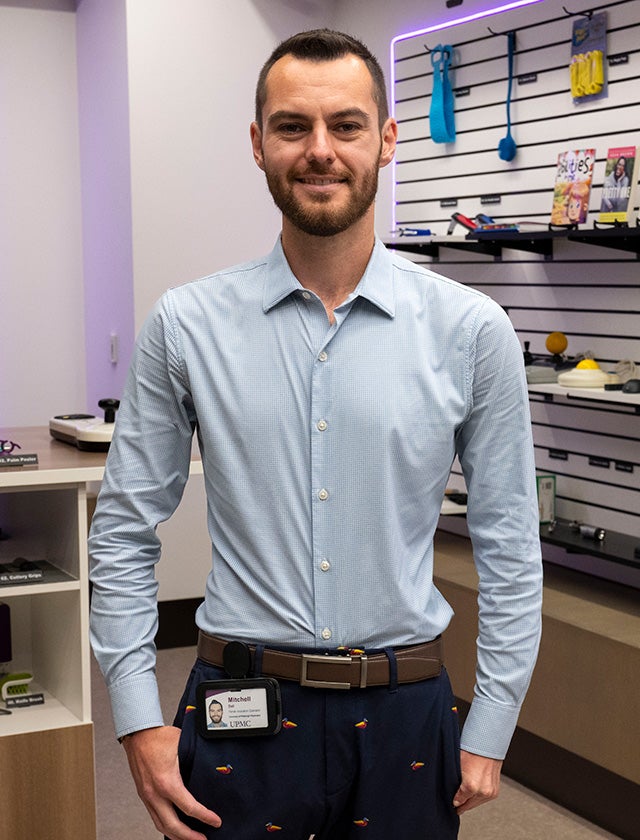
Subscribe to Pittwire Today
Get the most interesting and important stories from the University of Pittsburgh.An alum with a knack for assistive tech hacks.
When the patient begins to lose his sight, his doctors set him up with specialists and devices to address the mobility issues that will surely follow. Eventually, he feels confident he’ll be able to navigate his house and neighborhood. But no one talks about how he’ll get around the hairpin turns of his favorite racing video games.
Until Mitch Bell.
Bell is a rehab innovation specialist in UPMC’s Department of Physical Medicine and Rehabilitation. He was hired in 2022 to help build and run Assist+, a demonstration space for assistive technology located on the ground floor of the UPMC Mercy Pavilion in Pittsburgh’s Uptown neighborhood.
Bell’s goal is to find, create and set up the assistive technology devices that allow patients to continue the activities — cooking, gaming, reading and more — that give their lives joy and texture.
For this gamer, Bell has two solutions. First, he finds that one of his patient’s preferred racing games has a blind driving assist option, which uses noises to signal when to speed up, slow down, turn or move. Then Bell goes a step further, using his 3D printer to create a grooved map of the course that the patient can follow with his finger and commit to memory.
“After a little trial and error, he was able to feel his way around the track and was picking it up very quickly,” says Bell (SHRS ’16, ’19G).
It was, as every successful pairing is for Bell, a little victory.
Because he was born with limited mobility in his hand, just like the patients he works with at Assist+, Bell has long relied on assistive devices — often of his own design — to partake in his many hobbies.
As a kid, he spent his summers in Canada toiling alongside his grandfather, a tinkerer who built fiberglass boats and electric cars in the garage. As a student at Pitt, which through its affiliation with UPMC offers students clinical and research opportunities, Bell became a devoted gamer and boater and still dabbles as both a video game podcaster and a boat captain. He says he has never felt constrained.
“The mindset was always, ‘I can probably make something,’” says Bell. “And I just go through a few different versions until it’s right.”
With Assist+, Bell gets to share that inventiveness with patients who are seeking their own solutions. Recreational assistive technology — from adaptive cooking devices to game card shuffles — is often difficult to acquire, for a host of reasons. First, they’re not always talked about at doctors’ visits, where providers are chiefly concerned with acute care and mobility. Second, some items can be expensive and not covered by insurance. The Assist+ demonstration space allows patients to try the technology before they invest. If nothing there suits their needs, Bell has connections to manufacturers and community groups that can recommend alternatives.
And, of course, he has that 3D printer, which has solved many a tricky issue in the months Assist+ has been open. He recently printed a game controller attachment for a stroke patient who had lost function in one hand. It cost a mere $3 in plastic.
While Bell works with UPMC providers and regularly visits clinics at Children’s Hospital to get patients what they need, he also welcomes the general public to visit Assist+ — no referral required.
“The goal,” Bell says, “is to make this technology available to everyone.”
Photography by Tom Altany
Want to check out Assist+ for yourself? The space is open from 9 a.m. to 4 p.m. Monday through Friday at 1622 Locust St., Pittsburgh, PA, 15219. Appointments are recommended by emailing assistplus [at] upmc.edu or by calling 878-261-6361.



